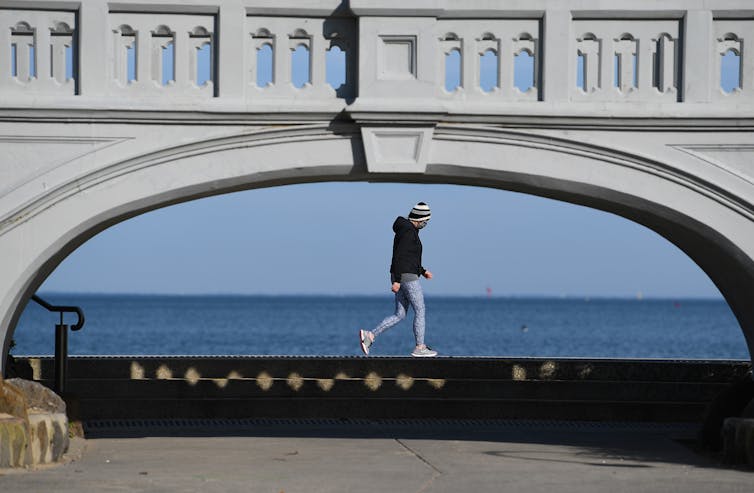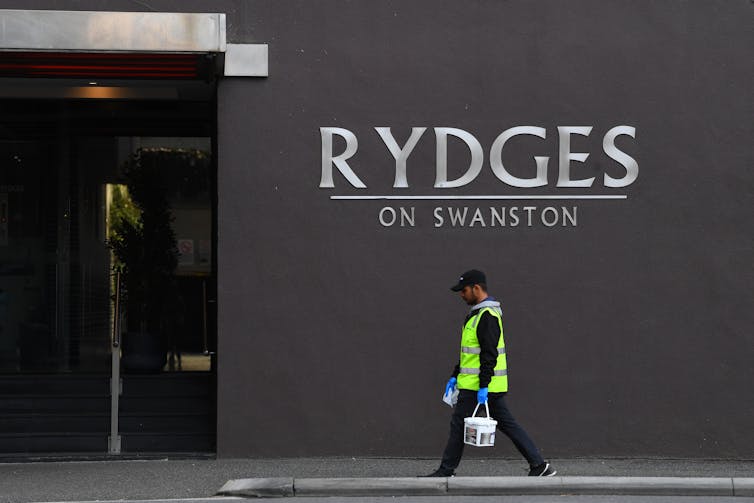the 'wicked' balancing act for governments
- Written by Sarah Joseph, Professor of Human Rights Law, Griffith University
COVID-19 has caused a global public health emergency, a global economic emergency, and a global human rights emergency. The crisis is detrimentally affecting all recognised human rights in every country.
Unrestrained spread of COVID-19 is prejudicial to the human rights to life and health. All governments have human rights obligations to take appropriate measures to combat the spread of the virus.
Human rights v COVID-19
COVID-19 restrictions have imposed extraordinary restrictions on countervailing human rights. COVID measures interfere with economic, social and cultural rights, such as rights to work, adequate standards of living, education, and mental health. They also interfere with civil and political rights, such as freedoms of movement, association, assembly, the right to a fair trial, as well as the rights of families and children.
In response to recent questions about the human rights compatibility of the curfew in Victoria, Premier Daniel Andrews bluntly responded that the curfew was “not about human rights”, but rather “human life”. That is a stark dichotomy, which leaves little space for human rights arguments. However, human rights are not optional extras, even in this pandemic.
Limits to human rights
Most internationally recognised human rights can be limited in certain circumstances. Even the right to life, globally recognised in Article 6(1) of the International Covenant on Civil and Political Rights, is subject to limitations. A person must not be “arbitrarily” deprived of life, so “non-arbitrary” deprivations are permissible.
Indeed, every government routinely balances the interest in preserving life against other societal benefits in their calibration of numerous everyday policies, such as those regarding speed limits.
Of course, the nature of the right to life dictates that few limitations are tolerable. Furthermore, a COVID outbreak has the potential to be catastrophic, costing many lives, causing debilitating long-term illness to many more, and overwhelming health systems.
But there must be some limit, even in the context of COVID-19. Human rights law does not mandate harsh lockdowns until elimination of COVID-19 or the development of a cure or vaccine. The question becomes one of just how much increased sickness and death, or risk thereof, is permissible under international human rights law?
The flipside of that question is to ask what human rights restrictions are permissible to suppress COVID-19 and decrease the risk of sickness and death?
 Governments must decide how much to infringe on human rights to save lives.
AAP/James Ross
Governments must decide how much to infringe on human rights to save lives.
AAP/James Ross
Proportionality, risk and catastrophe
A key concept in working out the appropriate limitations to rights is that of proportionality: are the limiting measures reasonably necessary for the achievement of a legitimate purpose?
A key consideration in the test of proportionality is how important the limitation might be. The purpose of stopping the spread of COVID-19 is vitally important. But a more precise way of phrasing the purpose of most restrictions is to “stop the risk of the spread of COVID-19”.
For example, the quarantining of a person known to have COVID-19 contains spread, whereas the quarantining of someone who might have it contains risk. As it is impossible to know who might have COVID-19, it may be assumed that containment of spread is the same as containment of risk. But is this so? Not all risks are the same.
Consider the following example. Most Australian states and territories have imposed border restrictions (of varying degrees of strictness and geographic impact) to stop infections from being introduced from interstate. These measures restrict freedom of movement and forcibly separate families and friends.
Sarah Caisip is a Canberra woman who was unable to attend her father’s funeral and comfort her family in Queensland. She was refused an exemption from hotel quarantine due to the potential risk that she might introduce infection to Queensland. Was this a breach of her right to family life?
The ACT has not recorded a positive COVID diagnosis for months. The risk posed by Caisip is tiny: there is virtually no chance she has COVID-19. So the chance she would transmit the virus and cause a serious or catastrophic outbreak was infinitesimal. The problem is every single catastrophic outbreak, anywhere, has logically been sparked by a single case.
Read more: Grattan on Friday: When grief meets politics, it is sad and ugly
So in the Caisip example there is, on the one hand, a miniscule risk, but on the other, the potential for devastating outcomes if the risk materialises. Furthermore, the stakes seem amplified when COVID-19 is under ostensible control, as in Queensland and the less populous states: few decision-makers want to risk the replacement of a situation of control with one of a lack of control.
If decisions can be justified by the possibility of catastrophic outcomes from tiny risks, they can logically be justified if risks are larger, even if still very small. However, there is the danger any measure can be justified based on its marginal impact, or even potentially marginal impact, on reducing the risk of catastrophic outbreak.
For example, Victoria’s curfew has been criticised on human rights grounds. The virus is not more infectious at night. The curfew was not requested by either Victoria’s health authorities nor its police.
 Victoria’s lockdown curfew has been criticised, but does the potential risk reduction make it worth it?
AAP/James Ross
Victoria’s lockdown curfew has been criticised, but does the potential risk reduction make it worth it?
AAP/James Ross
However, perhaps the curfew prevented an illicit party which might have led to further extensive spread and longer lockdown in Victoria. Alternatively, that illicit party may have simply moved to the daytime. Regardless, does the possibility of a benefit make the curfew “worth it”?
What of the lockdown of public housing towers in inner Melbourne without notice in early July? It seems doubtful this unique imposition of mass home detention without notice was justified by the chance a COVID-positive resident would abscond and spread the virus.
If we accept anything that might reduce the risk of COVID-19 infections is permissible, we may effectively permit extreme measures with only marginal, and perhaps no actual, benefit. Proportionality is reduced to a rubble, and human rights considerations are effectively jettisoned. If so, the most vulnerable and marginalised are those most likely to have their rights abused.
Read more: Melbourne tower lockdowns unfairly target already vulnerable public housing residents
Government officials deserve some sympathy in having to engage in a wicked “balancing” exercise involving a novel deadly pathogen. But it is very likely some laws and decisions have overreached, and important human rights have been displaced by restrictions with dubious benefit.
It is vital governments face scrutiny and remain accountable over the human rights compatibility of COVID measures.
Systems matter
Under international human rights law (and some domestic laws), Australian governments must take all reasonable measures to prevent and manage COVID infections. Requisite measures extend beyond coercive restrictions to the establishment of appropriate systems to control spread of the virus.
This is particularly important as system failure has contributed greatly to the spread of the virus in Australia and beyond. There are major weaknesses in the regulation of aged care homes, where there has been a devastating death toll in Melbourne. Hotel quarantine failure sparked the Victorian second wave, while sub-optimal contact tracing failed to detect extensive spread before it was too late.
 Systems failures, such as the hotel quarantine disaster, have had a huge impact on the virus’ outbreak in Victoria.
AAP/James Ross
Systems failures, such as the hotel quarantine disaster, have had a huge impact on the virus’ outbreak in Victoria.
AAP/James Ross
Communications strategies must ensure public health messaging reaches all parts of society. Indeed, the pandemic has exposed the inadequacy of public services globally in coping with an emergency after years of austerity policies.
While some institutional reforms necessarily take time, some can happen quickly. For example, Victoria has probably significantly improved its contact tracing capacities already.
System improvements will help to ensure against further major outbreaks in Australia. Lockdowns and other general human rights restrictions are not the only tool in the kitbox. System improvements should give Australian governments greater confidence in managing the risks associated with any easing of coercive restrictions.
Balancing the right to life with the right to live
Sensibly, Australians are prioritising safety for themselves and their communities over freedom during the COVID-19 pandemic. But how much risk avoidance is sustainable socially, economically, politically, and even legally, if COVID cures and vaccines remain unavailable?
The continued adoption of an extreme precautionary approach could mean Australia remains balkanised, loved ones (including the vulnerable) separated, livelihoods destroyed, and coercive measures tolerated where they offer little benefit. And the countervailing human rights issues will only loom larger and larger. The human right to life is vitally important, but there is also a human right to live.
Authors: Sarah Joseph, Professor of Human Rights Law, Griffith University
Read more https://theconversation.com/covid-19-risk-and-rights-the-wicked-balancing-act-for-governments-146014



















